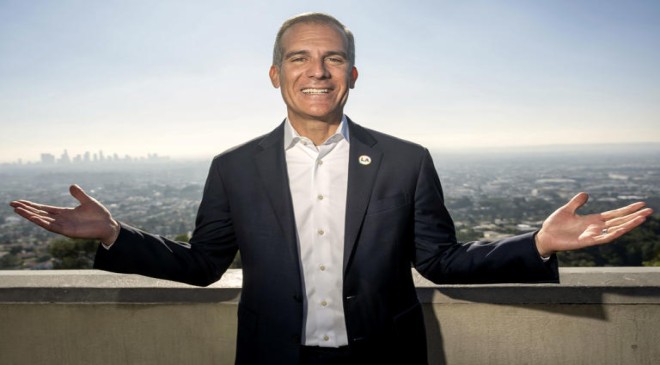After more than two years, the U.S. finally has an ambassador to India: Eric Garcetti.
On Wednesday, the U.S. Senate confirmed former Los Angeles Mayor Garcetti’s appointment as the country’s envoy to India, 20 months after President Joe Biden nominated him. The confirmation was held up in part due to concerns over how he responded to allegations against his friend and once-adviser, Rick Jacobs, who was accused of sexual harassment during the then-mayor’s tenure at City Hall.
“We look forward to working with him to take forward our multifaceted bilateral relations,” Arindam Bagchi, spokesperson for India’s external ministry, told reporters at a briefing Thursday.
The confirmation of Garcetti, a 52-year-old Biden loyalist, ends a vacuum in one of the country’s highest profile diplomatic posts. India is the world’s most populous country, and the U.S. sees it as a geopolitical force China has to reckon with, as the latter asserts its authoritarian regime in the Indo-Pacific region.
Also Read– China has shattered the assumption of US dominance in the Middle East
But Garcetti’s job isn’t likely to be easy, having already provoked the ire of some Indians due to comments he’s made in the past. During Garcetti’s confirmation hearings in 2021, he said he would “actively raise” human rights issues in New Delhi, in response to a question about the Citizenship Amendment Act, which the Indian parliament passed in 2019. The law, a cornerstone and campaign promise by the ruling Hindu-nationalist Bharatiya Janata Party (BJP), grants immigrants from Afghanistan, Pakistan, and Bangladesh a shot at applying for Indian citizenship—but only if they are Hindu, Christian, Sikh, Jain, Parsi, or Buddhist. It was criticized for making Muslims from those countries into “illegal migrants” and seemingly relegating India’s Islamic community of some 200 million people into second-class citizens. Widespread protests against the law erupted across the South Asian nation in 2020.
Read More:-North Korea decides on war deterrence measures, KCNA says
Since coming to power in 2014, the BJP, with President Narendar Modi at the helm, has overseen a marked rise in Hindu supremacy and anti-Muslim sentiment in India.
When asked about Garcetti’s remarks on human rights, Bagchi, India’s external affairs ministry spokesperson, said he has not heard of any recent comment from the diplomat-designate. “There is something on social media, which is very old,” he said. “Our position on many of these issues are well-known.”
Also Read– Japan’s Kenzaburo Oe, awarded Nobel for poetic fiction, dies
Tarun Vijay, a former BJP member of India’s upper parliament house, posted on Twitter on Wednesday that sending an ambassador “with a political agenda to interfere in our domestic issues with false notions” is “ignorant and arrogant” and “must not be acceptable.” And Abhinav Prakash, the vice president of BJP’s youth wing, told Russian state-owned news agency Sputnik India that Garcetti’s appointment could fuel “anti-West sentiment” in India.
The BJP doesn’t represent everyone’s views though. The U.S. Chamber of Commerce’s U.S.-India Business Council wished Garcetti well in taking over the post left by Kenneth Juster in 2021. The council’s deputy managing director Shreerupa Mitra, who is based in Delhi, said Garcetti’s confirmation will help the U.S. and India “achieve critical goals in decarbonization, human development, and economic resilience.” Indian-American community leader Ajay Bhutoria also congratulated Garcetti, tweeting that he believes the new U.S. ambassador “will work tirelessly to deepen this relationship and promote cooperation” between the two countries.
Read More:-North Korea decides on war deterrence measures, KCNA says
India’s relationship with the U.S. significantly improved in 2022: Biden met with Modi twice, strengthening trade ties between the two countries, and reinforcing the regional Quad security dialogue with Japan and Australia. Yogesh Joshi, a research fellow at the National University of Singapore’s Institute of South Asian Studies, says Garcetti is likely to prioritize this warming alliance, which may see his pursuit of a human rights-focused agenda in New Delhi take a backseat.
“The democratic values provide the icing on the cake, but that is not what is driving the Indo-U.S. relationship,” Joshi tells TIME.







































